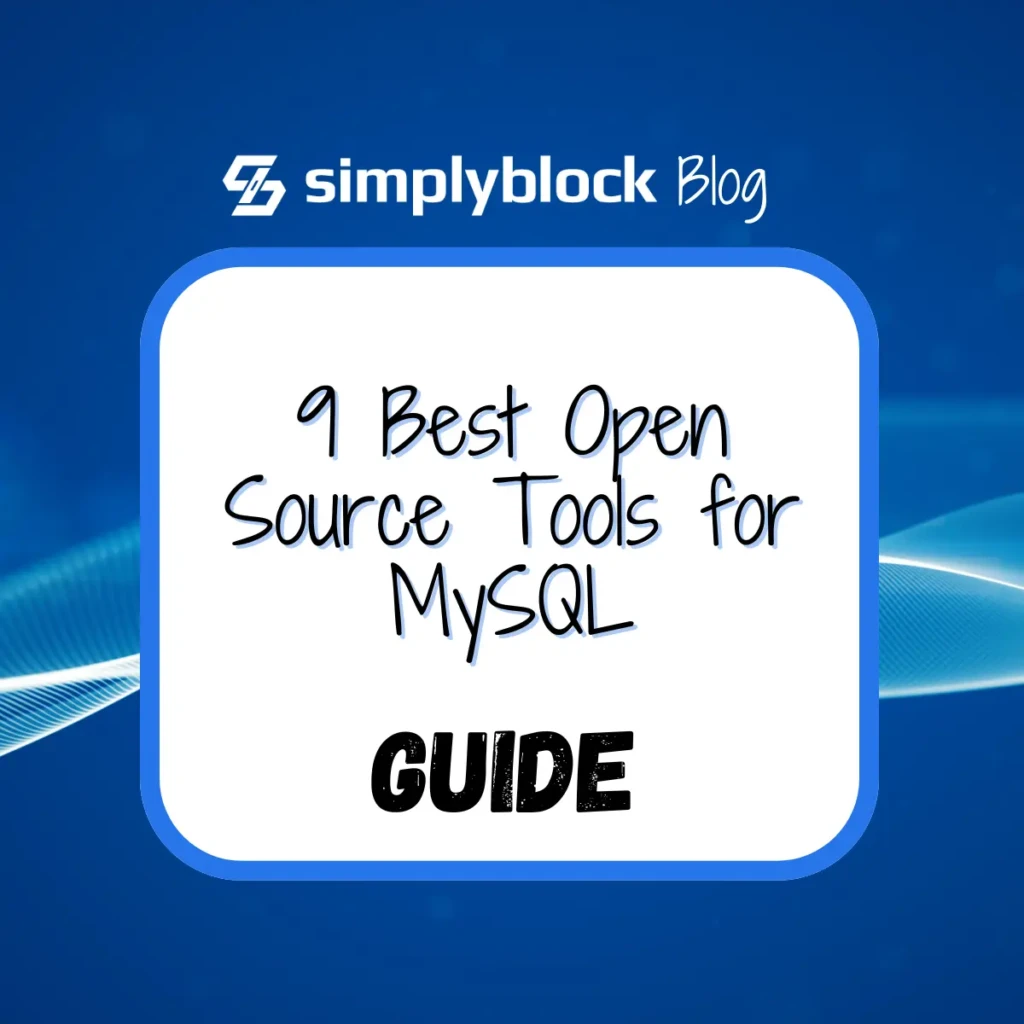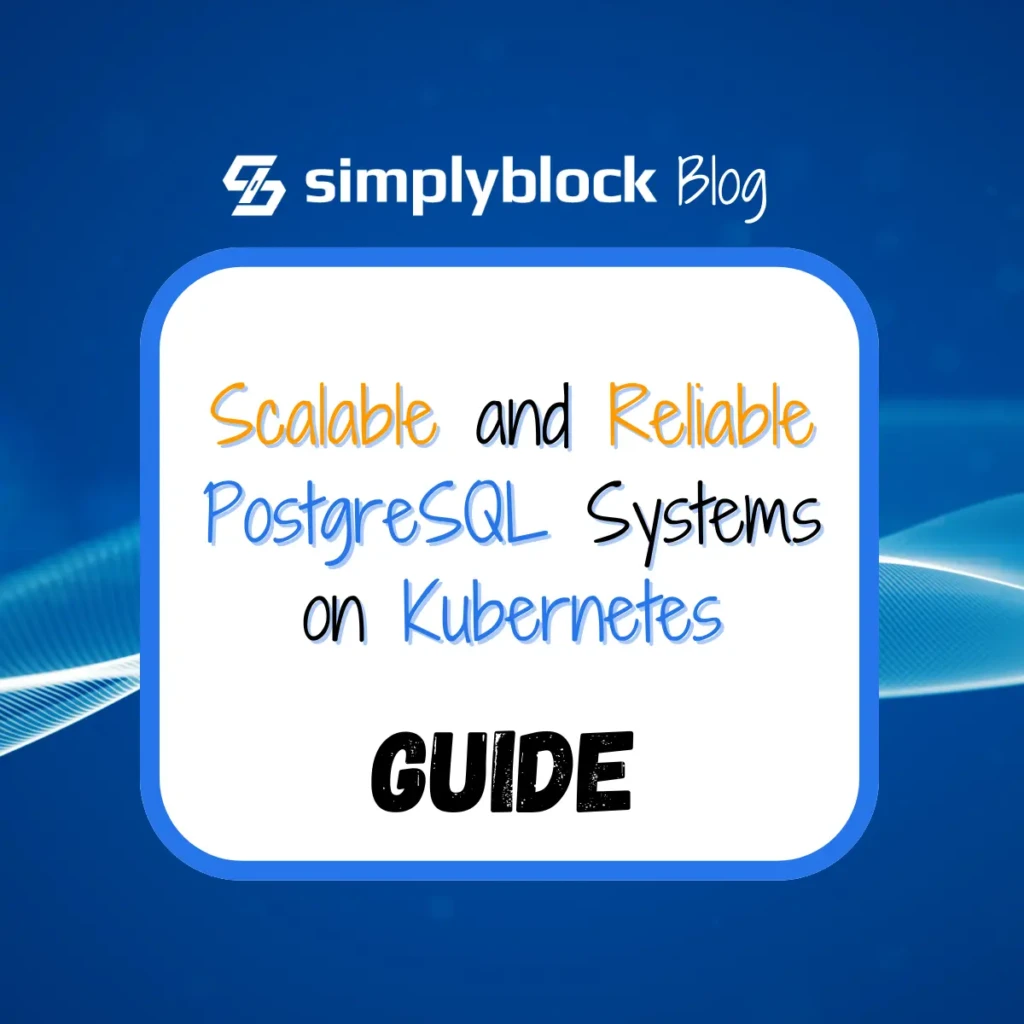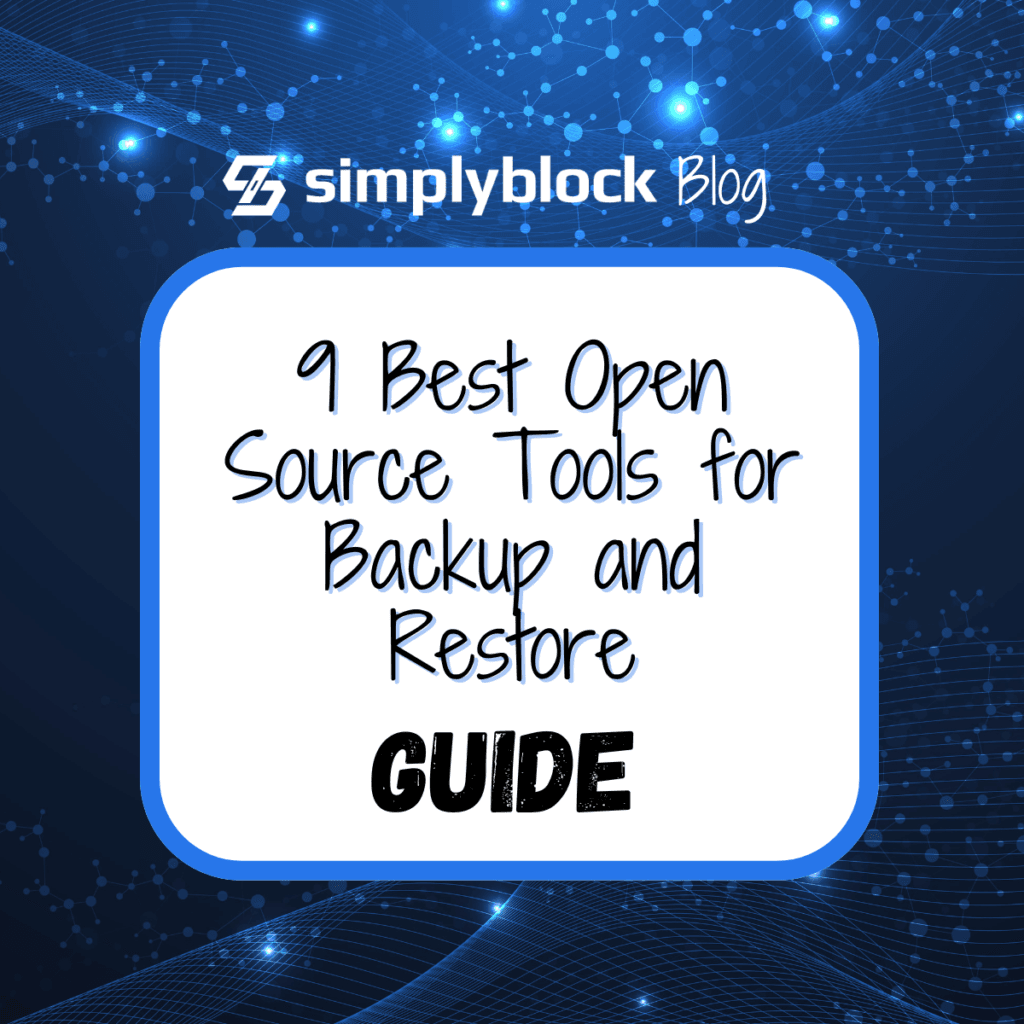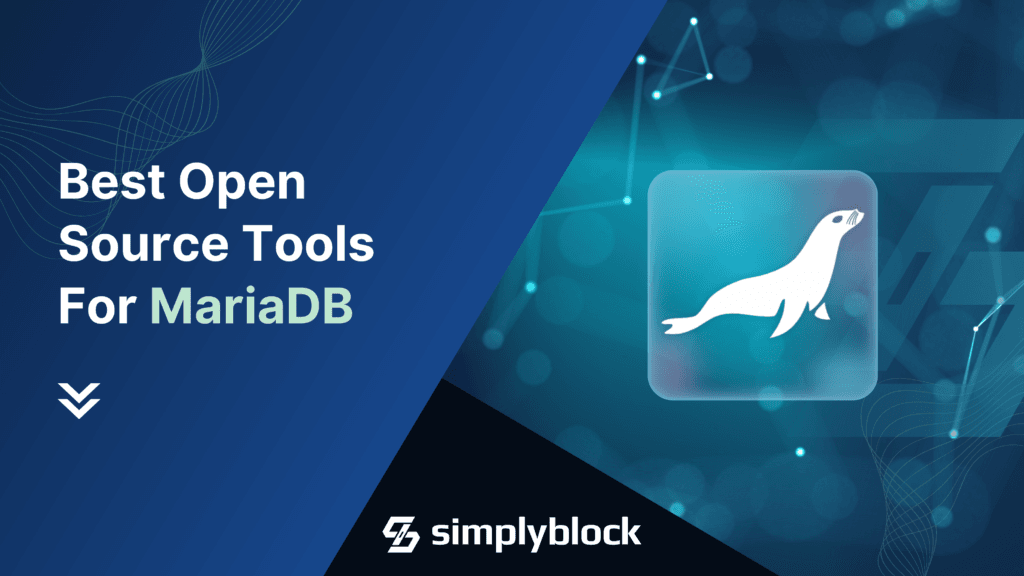
What are the best open-source tools for your MariaDB setup?
MariaDB is a community-developed, commercially supported fork of the MySQL relational database management system, intended to remain free and open-source software under the GNU General Public License.
support, the demand for reliable and effective open-source tools has increased. Database administrators and developers are always on the lookout for tools that can help them better manage their MariaDB environments.
Here are the nine must-know open-source tools that can help you optimize your MariaDB environment:
1. Adminer
Adminer is a lightweight and powerful web-based database management tool that supports MariaDB. It offers a simpler and more secure alternative to phpMyAdmin, allowing you to manage databases, tables, columns, relations, indexes, users, and more. Adminer’s clean interface and extensive features make it an excellent choice for MariaDB administration.
2. DBeaver
DBeaver is a universal database management tool that supports MariaDB along with many other databases. It provides a robust set of features for SQL development, data browsing, and administration. With its intuitive interface, DBeaver helps developers and DBAs efficiently manage MariaDB databases, including query execution, data visualization, and database schema management.
3. Percona Monitoring and Management (PMM)
Percona Monitoring and Management (PMM) is an open-source platform for managing and monitoring MariaDB and other databases. PMM provides deep insights into database performance, query analytics, and system health. It is particularly useful for identifying performance bottlenecks and optimizing MariaDB databases to ensure they run at peak efficiency.
Simplyblock can enhance this further by offering visibility into storage-level metrics — helping teams identify and resolve I/O bottlenecks flagged in PMM dashboards.
4. Galera Cluster
Galera Cluster is a popular open-source solution for multi-master replication with MariaDB, providing synchronous replication and high availability. It ensures that changes made on any node are immediately applied to all other nodes, maintaining data consistency across the cluster. Galera Cluster is essential for applications that require high availability and fault tolerance.
By using simplyblock’s NVMe-over-TCP architecture and multi-attach volumes, Galera deployments can reduce replication lag while simplifying storage management across cluster nodes.
5. MaxScale
MaxScale is an advanced database proxy developed by MariaDB Corporation. It provides load balancing, query routing, and database firewall capabilities for MariaDB. MaxScale enhances the security and scalability of MariaDB environments by managing connections and queries between applications and the database, making it an essential tool for large-scale deployments.
Simplyblock can support MaxScale environments by enabling high-throughput, low-latency access to underlying data, ensuring consistent performance under load.
6. Zabbix
Zabbix is an open-source monitoring tool that supports MariaDB along with a wide range of other systems. It provides comprehensive monitoring of database performance, including query execution times, resource usage, and server health. Zabbix’s alerting system ensures that you are immediately notified of any issues in your MariaDB environment, allowing for prompt resolution.
7. ProxySQL
ProxySQL is an advanced high-performance proxy for MariaDB that enhances database performance, scalability, and reliability. It supports features such as query caching, query routing, and connection pooling. By acting as an intermediary between applications and the database, ProxySQL helps optimize the performance of MariaDB clusters, making it a valuable tool for high-traffic environments.
Combined with Simplyblock’s dynamic storage orchestration, ProxySQL can benefit from faster disk access and more efficient handling of read/write-heavy workloads.
8. MySQLTuner
MySQLTuner is a script that helps optimize MariaDB (and MySQL) database performance by analyzing your database setup and providing recommendations. It reviews database configuration and operating system variables to suggest improvements that can enhance the performance and stability of your MariaDB instance.
9. MariaDB Backup
MariaDB Backup is an open-source tool for performing consistent physical backups of MariaDB databases. It supports full and incremental backups, as well as point-in-time recovery. MariaDB Backup is designed to be a reliable and efficient solution for safeguarding your data, making it an essential tool for disaster recovery and data protection.
Simplyblock adds to this by enabling consistent, volume-level snapshots and binary log streaming to S3 — delivering near-zero RPO without performance tradeoffs.
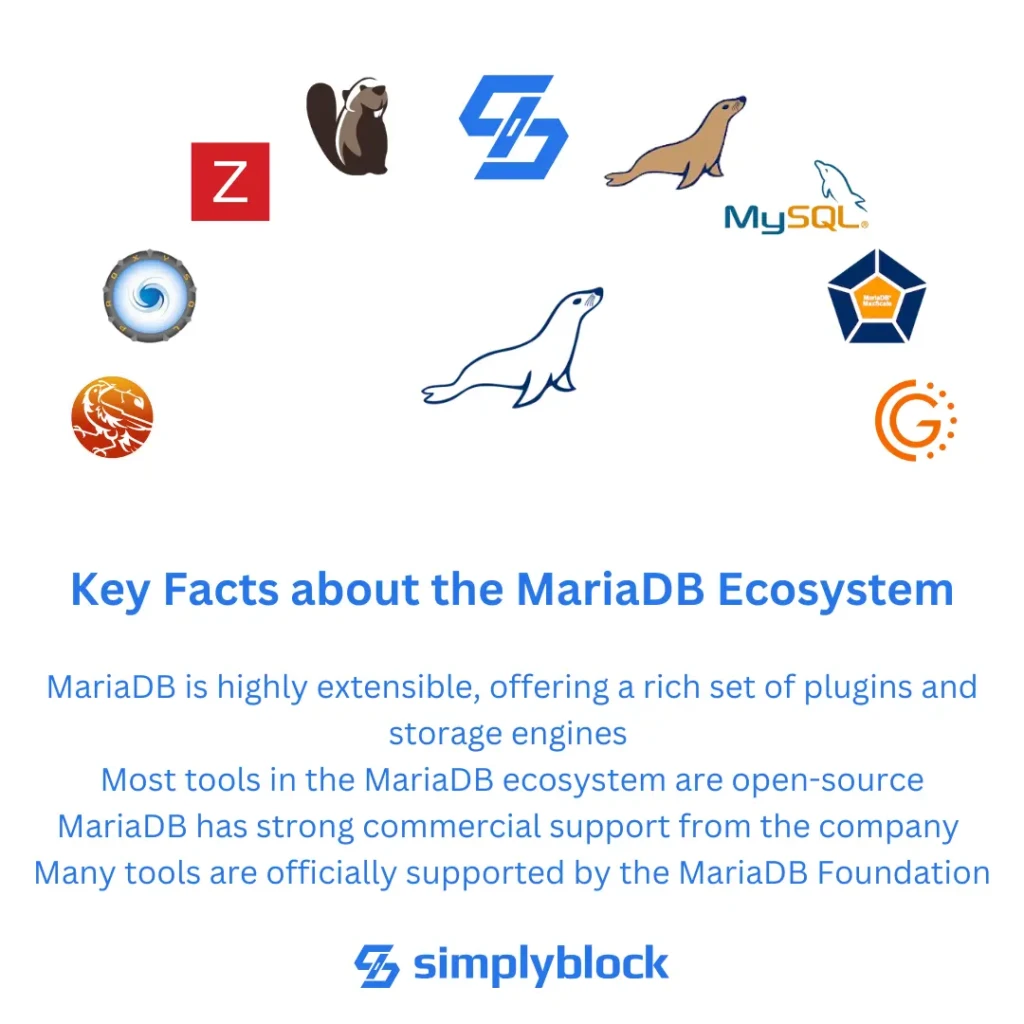
Why Choose simplyblock for MariaDB?
While MariaDB provides robust data management capabilities inherited from MySQL, optimizing storage performance and ensuring efficient management of InnoDB files and binary logs remains challenging. This is where simplyblock’s intelligent storage optimization creates unique value:
Optimized MariaDB Storage Management:
Simplyblock enhances MariaDB’s storage efficiency through intelligent volume orchestration. Using thin provisioning and automatic tiering, simplyblock optimizes storage utilization for InnoDB tablespaces, Aria tables, and binary logs.
The platform creates separate storage volumes with tailored performance characteristics – providing ultra-low latency NVMe storage for transactional logs while automatically moving cold data to cost-effective S3 storage.
This is particularly valuable for organizations managing large-scale MariaDB deployments with mixed workloads, where storage costs and performance requirements vary significantly across different table types.
MariaDB High Availability Enhancement:
Simplyblock streamlines MariaDB’s replication and clustering capabilities through its unified storage approach. The platform’s multi-attach features and NVMe over TCP protocol ensure minimal replication lag in Galera Cluster deployments while simplifying storage management.
Instead of managing separate EBS volumes for each cluster node, simplyblock’s storage pooling provides efficient resource utilization while maintaining data consistency. This architecture particularly benefits organizations running complex high-availability setups, complementing tools like MaxScale for comprehensive cluster management.
Enterprise-Grade Data Protection:
Simplyblock strengthens MariaDB’s disaster recovery capabilities through sophisticated backup and replication features. The platform’s ability to create consistent snapshots across multiple volumes ensures that backups maintain referential integrity across database instances, particularly crucial for distributed environments.
By streaming binary logs to S3, simplyblock provides near-zero RPO disaster recovery without impacting database performance. This approach significantly enhances MariaDB Backup’s capabilities while simplifying operational complexity, making it especially valuable for organizations requiring robust disaster recovery solutions while maintaining strict data consistency across their MariaDB infrastructure.
How to Optimize MariaDB Storage with open-source Tools?
This guide explored nine essential open-source tools for MariaDB, from Adminer’s web interface to MariaDB Backup’s recovery capabilities. While these tools excel at different aspects – PMM for monitoring, MaxScale for proxy management, and Galera Cluster for replication – proper implementation is crucial.
Tools like MySQLTuner enable performance optimization, while ProxySQL provides connection management. Each tool offers unique approaches to managing and optimizing MariaDB deployments.
If you’re looking to further streamline your MariaDB operations, simplyblock offers comprehensive solutions that integrate seamlessly with these tools, helping you get the most out of your MariaDB environment.
Ready to take your MariaDB management to the next level? Contact simplyblock today to learn how we can help you simplify and enhance your MariaDB journey.
For organizations looking to elevate performance, simplify infrastructure, or cut storage costs, Simplyblock offers seamless integration with many of these tools — providing a stronger foundation for MariaDB operations.
Questions and Answers
DBeaver is a free, open-source database management tool that supports various databases, including MariaDB. It offers a user-friendly interface with features like SQL editing, data browsing, and visual query building. DBeaver is cross-platform, working on Windows, macOS, and Linux
HeidiSQL is a lightweight, open-source administration tool designed for MariaDB and MySQL. It allows users to manage databases, browse and edit data, create and modify tables, and execute SQL queries. HeidiSQL is known for its speed and ease of use, making it a popular choice among developers.
phpMyAdmin is a web-based administration tool for MySQL and MariaDB. It enables users to perform various database tasks such as creating, modifying, and deleting databases, tables, and rows. phpMyAdmin also supports executing SQL statements and managing users and permissions, all through an intuitive web interface.
Yes, Adminer is a single-file, full-featured database management tool that serves as an alternative to phpMyAdmin. It supports multiple databases, including MariaDB, and offers features like data editing, SQL execution, and database schema visualization. Adminer’s lightweight nature and ease of deployment make it a favorable choice for many developers
Tools like SymmetricDS and HammerDB can assist in monitoring and testing MariaDB performance. SymmetricDS is designed for database and file synchronization with multi-master replication, while HammerDB is a load testing and benchmarking tool for databases, including MariaDB.



